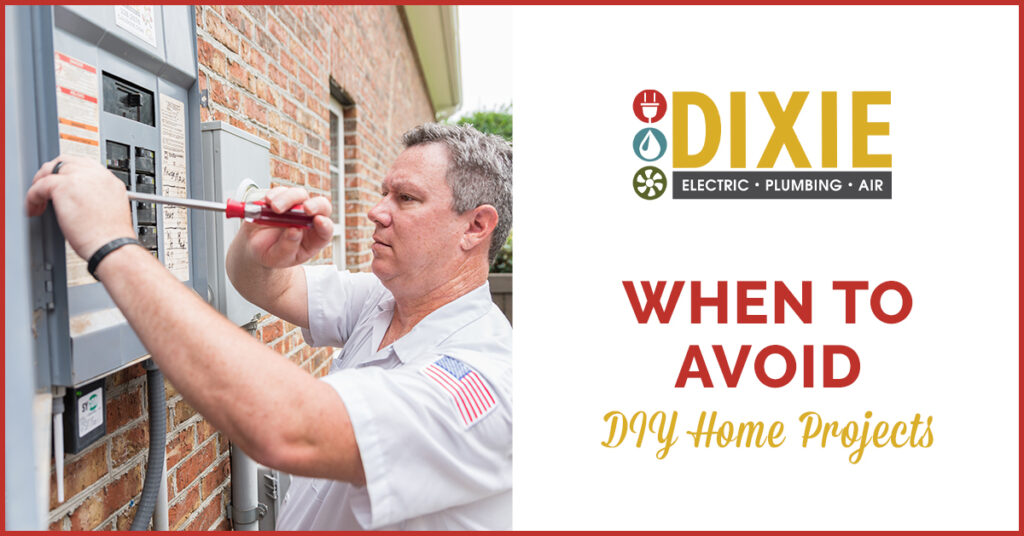Unfortunately, most of us know the struggle of having to dip into the emergency fund to fix a clogged toilet or malfunctioning HVAC system. It’s no surprise that many homeowners are quick to DIY their own home improvements as an alternative to pricey and surprise repairs. The bad news? In many cases, handling a repair yourself can cause more damage to home safety in the long run.
When to Avoid DIY Home Projects
Over the last couple of years, there’s been a significant increase in the amount of DIY home projects. After watching a YouTube video or two, homeowners can trick themselves into the mindset of “Well, I could do that.”
Our service professionals at Dixie have seen time and time again how non-professionals attempting to solve HVAC, electrical, and plumbing problems have wreaked havoc on their homes. We’ve put together a list of advice, tips, and warnings when attempting to DIY a home project.
Home Projects to Avoid Doing Yourself
As a do-it-yourselfer, it’s always best to start small. If you’ve never looked under your kitchen sink before, it’s probably not best to do it for the first time during a major home renovation. While you may be able to fix a leaky sink or install a window HVAC unit alone, there are some projects that you should not attempt for your own protection, as well as your home safety.
Here are some projects you should call in the professionals for:
- Rebuilding Your Bathroom Plumbing System
Without the proper knowledge, this project could have the potential for disastrous results, such as flooding or electrocution. - Replacing Your Electrical Panel
Trying to understand your electrical system on your own can result in many risks, such as code non-compliance or house fires in more severe cases. - Demolition of Electrical Systems
A professional electrician can help you determine how to remove an outlet or junction box safely and will save you time and energy in the long run. - Repairing Your HVAC Unit
HVAC jobs are best left to the professionals due to the HVAC’s use of chemical refrigerants and electricity.
Safety Tips for Home Projects
If you do decide to embark on a DIY home project, we recommend the following measures to protect your personal and home safety:
- Wear Protective Gear
Wearing protective gear is essential. Protective equipment keeps dust and other irritants out of the lungs, protects hands from unwanted chemical exposure, cuts and burns, protects hearing from the sound of loud machinery, and protects eyes from flying debris. - Take Time to Prepare
For some do-it-yourself home repairs, you’ll need to make sure you have your tools ready, your plan in place, and your health insurance up-to-date (just in case!). - Start Small
Finally, don’t begin with a massive home renovation project. Instead, start with a less-risky task and make sure you have a complete understanding of how to operate your tools.
Dixie is Here to Help
While you may see DIY home repairs as the alternative to calling in a professional, there is another solution: preventative maintenance. Instead of waiting for a breakdown to occur, participating in a preventative maintenance plan such as Dixie Cares is an effective way to maximize your home’s energy efficiency, maintain home safety, and save money in the long run.
Call Dixie, and it’s done!
If you would like to learn more about home safety and ensure your property is not at risk of carbon monoxide exposure, please do not hesitate to contact us for more information.
To schedule a service with Dixie, call for 334.232.0236 Montgomery or 334.835.5161 for Auburn. You can also schedule an appointment online.







